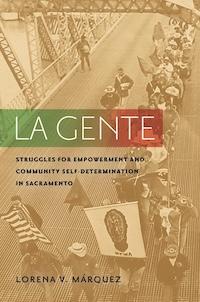
La Gente (University of Arizona Press, October 2020) by Lorena Márquez, assistant professor of Chicana/o studies , traces the rise of the Chicana/o Movement in Sacramento and the role of everyday people in galvanizing a collective to seek lasting and transformative change during the 1960s and 1970s. In their efforts to be self-determined, la gente contested multiple forms of oppression at school, at work sites, and in their communities.
Born in Lodi, California to Mexican migrant farmworkers and raised in nearby Galt, Dr. Lorena V. Márquez has never forgotten her roots. In fact, as the fourth of seven children who grew up in poverty with hardworking parents who made countless sacrifices, she credits her humble upbringing for the ganas (drive) to pursue her academic and activist goals. As a native Spanish-speaking daughter of immigrants and first-generation college student, she knows firsthand of the challenges many Chicanx and Latinx students face inside and outside of the classroom. In fact, as the first and only member of her family to go to college, she is keenly aware of educational inequities and is committed to making college truly accessible to all—regardless of citizenship or socio-economic background.
Dr. Márquez serves as the Project Director of the Sacramento Movimiento Chicano and Mexican American Education Project Oral History Project, a collective of Sacramento Chicana/o movement elders and organizers whose mission is to record and preserve the oral histories of Sacramento Chicana/o Movement activists from 1965-1980. During the spring 2014 and 2015 quarters, her UC Davis Qualitative Methods Research undergraduate students conducted interviews of Sacramento Chicana/o movement activists and participants as part of their course requirements. In the winter 2019 and 2020 quarters, her students transcribed the interviews. To date, there are 98 video-recorded oral histories. These interviews are housed at the Sacramento State Special Collection and University Archives.
View the book at University of Arizona Press
